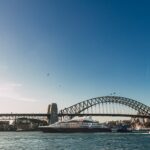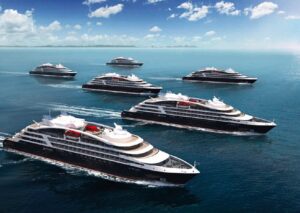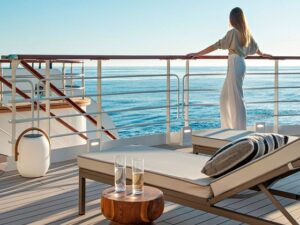 The current wrangle between luxury cruise line Ponant and New Zealand bureaucrats – over a planned cruise season that the Kiwi travel industry is desperate for – has raised doubts about the viability of any trans-Tasman “travel bubble”, free of quarantine and visa hassles, in the near future.
The current wrangle between luxury cruise line Ponant and New Zealand bureaucrats – over a planned cruise season that the Kiwi travel industry is desperate for – has raised doubts about the viability of any trans-Tasman “travel bubble”, free of quarantine and visa hassles, in the near future.
The bid by luxury cruise operator Ponant to operate a cruise program from New Zealand, a move widely welcomed by the industry, struck a severe bureaucratic snag over visas which saw the ship Le Lapérouse turned away from New Zealand and forced to divert to New Caledonia. See: Wiggles get into NZ but Ponant cruise ship hits visa storm
For once, Covid-19 is not an issue. It’s all about visas. New Zealand insists everyone aboard the ship must meet NZ requirements for work visas – otherwise they are deemed “non-essential workers” and Ponant must hire New Zealanders. This is an extremely unusual demand to make of a cruise line. Crew on ships, particularly smaller expedition ships, are experts at multi-tasking and their duties often include vital safety roles.
The whole carefully planned cruise program on Le Lapérouse is now in jeopardy. New Zealand online media outlet Stuff.co.nz yesterday quoted Warwick Beatson, director of a Kiwi travel agency, estimating that travel agents who sold tickets to 700 passengers stood to lose NZ$7 million in commissions. Smaller ports, desperate for business, stand to lose out because of what Beatson called “a pedantic set of rules”.

Le Lapérouse in Sydney. Photo: Dara Munnis
Ponant’s chairman Sarina Bratton told New Zealand media yesterday the ship was trying to recruit an extra 20 New Zealanders to meet Immigration NZ’s (INZ) requirements. Workers with maritime experience have been snapped up by super yachts visiting New Zealand for the America’s Cup, so finding suitable crew at short notice is a daunting task.
Bratton said Ponant was still negotiating with INZ about getting visas for 41 passenger service crew who needed maritime safety qualifications to handle any emergency at sea.
If INZ wasn’t prepared to be flexible on that point, the whole cruise season due to start this month could be cancelled.
“The last thing we would ever consider doing is compromising on safety and security,” Bratton
stated. “It doesn’t matter how much pressure is on, it’s a no-goer.”
The Ponant cruise season had been heralded as a good omen, a welcome forerunner to eventual quarantine-free travel across the Tasman.

Even that prospect is now under a cloud.
Australia’s international border is open without quarantine to New Zealanders (after a short recent suspension when the virus broke out from an Auckland quarantine hotel) but Australians are still denied quarantine-free entry to New Zealand.
New Zealand Prime Minister Jacinda Ardern said last week she would not open NZ borders to international tourists again until New Zealanders were “vaccinated and protected”. This process will not start for the general population until the middle of this year.
Ardern declared she was “disappointed” with the Australian government’s decision to suspend quarantine-free access for New Zealanders for three days, after a recent case of Covid-19 community transmission in New Zealand’s North Island. She said she would need further assurances that “short-notice border closures” would not be a feature of the trans-Tasman travel bubble.
Yet the so-called bubble is strictly one way: Ardern continues to refuse quarantine-free access to Australians and, making the situation even more complex, the Australian government refuses to let its own citizens and residents out of Australia without a permit.
Ardern said last week: “For travel to restart, we need one of two things: we either need the confidence that being vaccinated means you don’t pass Covid-19 on to others – and we don’t know that yet; or we need enough of our population to be vaccinated and protected that people can safely re-enter New Zealand. Both possibilities will take some time.”

Quarantine-free travel between Australia and New Zealand would greatly benefit tourism and business events operators in both markets, as well as Aussies and Kiwis seeking reunion with loved ones. The two countries are among the world’s closest – socially, economically and in trade and history.
For the whole calendar year 2019 (disregarding the distorted year 2020), New Zealand continued to be the leading destination country for Australians travelling overseas, with nearly 1.5 million trips. As well, New Zealand was the main supplier of visitors to Australia before the pandemic closed borders. New Zealand was also number-one visitor provider to Australia in December 2019, January 2020 and February 2020 – before Covid-19 sent the world haywire.
The two countries have handled the Covid-19 pandemic better than most others. If the coronavirus can be eliminated (or as close to that as possible) freed-up trans-Tasman travel may prove a lifesaver for the tourism industries of both nations.
Written by Peter Needham




















My understanding is that this sudden bureaucratic insistence from an NZ gov’t department is contrary to the manner in which Ponant has operated in and from NZ waters for a number of years. Peter Needham has quantified how disastrous this is for the country’s own tourism industry – and it’s implications are even more disastrous for the wider tourism industry. Here is a cruise company which has devised and negotiated an initiative with the aim of allowing Kiwis to travel within their own territory, with all the benefits that reinstates for them and all the businesses and communities who would begin to reap the economic and social benefits which flow to them. This bureaucratic, eleventh-hour interference from a gov’t department is right up there with the union interference in the policing of Victorian hotel quarantining, which unleashed the spread of COVID to the wider community. Some parts of our society are just so self-serving one wonders how their decision-makers ever rose to the level of incompetence that they have. May NZ’s Prime Minister’s reputation for taking right and practical actions come through in this case as well.